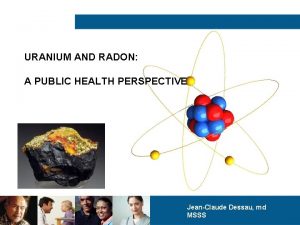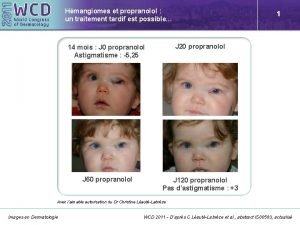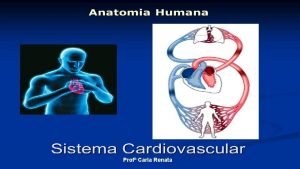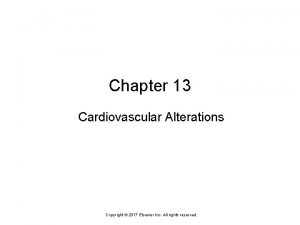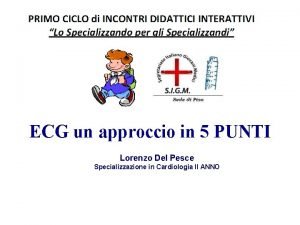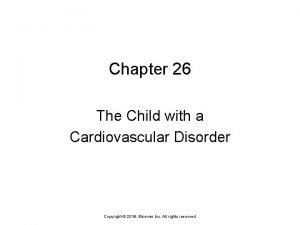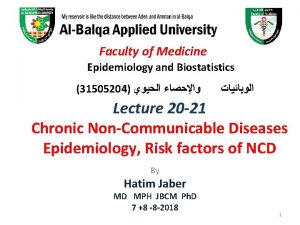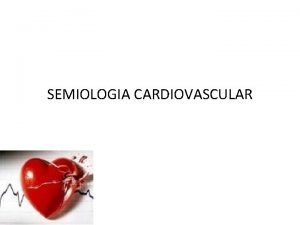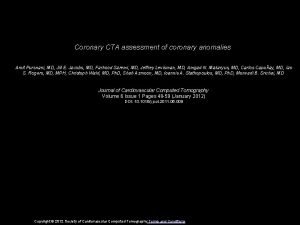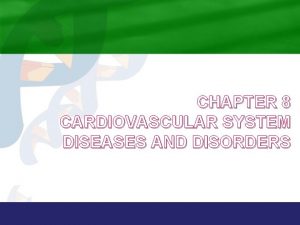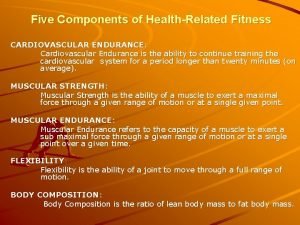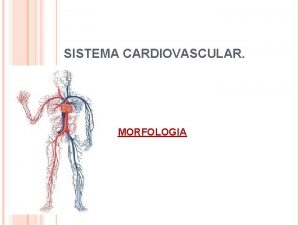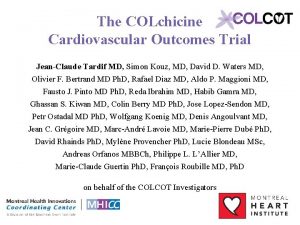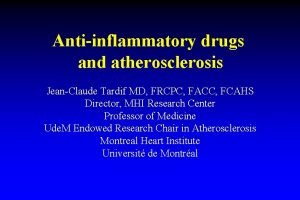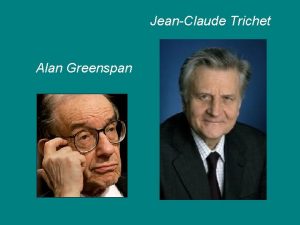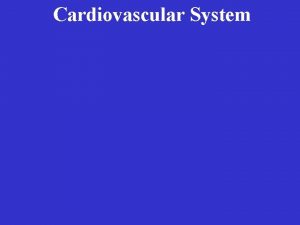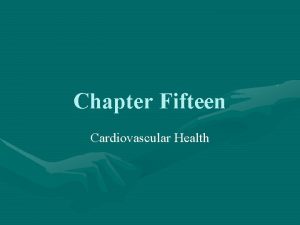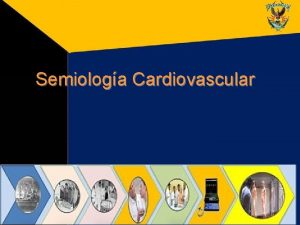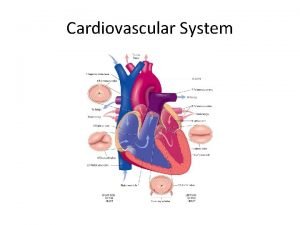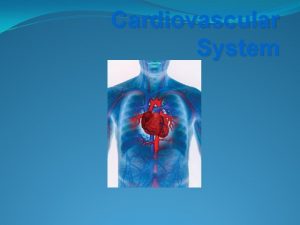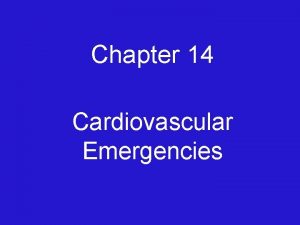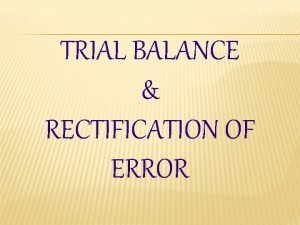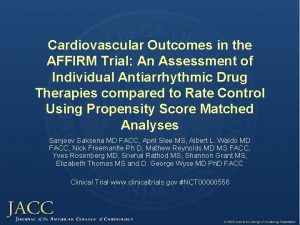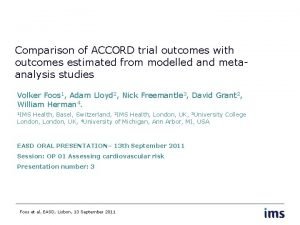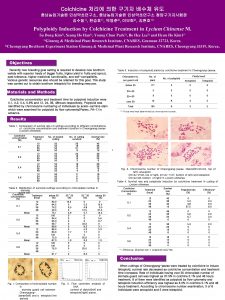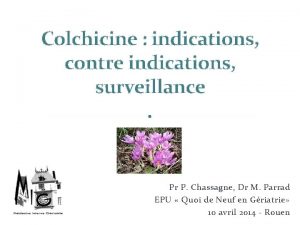The COLchicine Cardiovascular Outcomes Trial JeanClaude Tardif MD
















- Slides: 16

The COLchicine Cardiovascular Outcomes Trial Jean-Claude Tardif MD, Simon Kouz, MD, David D. Waters MD, Olivier F. Bertrand MD Ph. D, Rafael Diaz MD, Aldo P. Maggioni MD, Fausto J. Pinto MD Ph. D, Reda Ibrahim MD, Habib Gamra MD, Ghassan S. Kiwan MD, Colin Berry MD Ph. D, Jose Lopez-Sendon MD, Petr Ostadal MD Ph. D, Wolfgang Koenig MD, Denis Angoulvant MD, Jean C. Grégoire MD, Marc-André Lavoie MD, Marie-Pierre Dubé Ph. D, David Rhainds Ph. D, Mylène Provencher Ph. D, Lucie Blondeau MSc, Andreas Orfanos MBBCh, Philippe L. L’Allier MD, Marie-Claude Guertin Ph. D, François Roubille MD, Ph. D on behalf of the COLCOT Investigators

Background • Experimental and clinical evidence support the role of inflammation in atherosclerosis and its complications. • The search for a widely used anti-inflammatory treatment that may reduce the risk of atherosclerotic events in patients with coronary artery disease continues. • Colchicine is an orally administered, potent anti-inflammatory medication currently indicated for gout and pericarditis. • COLCOT was conducted in patients with a recent myocardial infarction to evaluate the effects of colchicine on cardiovascular outcomes and its long-term safety and tolerability.

Study design Post-myocardial infarction ≤ 30 days (n=4745 patients) On statin, anti-platelet agents, ±RAASi, ±BB Treated according to national guidelines PCI completed if planned Colchicine 0. 5 mg daily * Placebo daily * Primary composite endpoint: Time to first of CV death, cardiac arrest, MI, stroke, or urgent hospitalization for angina requiring coronary revascularization Secondary endpoints: Components of primary; composite of CV death, cardiac arrest, MI or stroke; total mortality *provided by Pharmascience (Montreal)

Patient characteristics Colchicine (N=2366) Placebo (N=2379) Age - years 60. 6± 10. 7 60. 5± 10. 6 Female sex - no. (%) 472 (19. 9%) 437 (18. 4%) Caucasian - no. (%) 1350/1850 (73. 0%) 1329/1844 (72. 1%) 28. 2± 4. 8 28. 4± 4. 7 Smoking - no. (%) 708 (29. 9%) 708 (29. 8%) Hypertension - no. (%) 1185 (50. 1%) 1236 (52. 0%) Diabetes - no. (%) 462 (19. 5%) 497 (20. 9%) Prior MI - no. (%) 370 (15. 6%) 397 (16. 7%) Prior PCI - no. (%) 392 (16. 6%) 406 (17. 1%) Prior CABG - no. (%) 69 (2. 9%) 81 (3. 4%) Prior heart failure - no. (%) 48 (2. 0%) 42 (1. 8%) Prior stroke/TIA - no. (%) 55 (2. 3%) 67 (2. 8%) Body-mass index - kg/m 2

Patient characteristics Colchicine Placebo (N=2366) (N=2379) 13. 4 ± 10. 2 13. 5 ± 10. 1 2192/2364 (92. 7%) 2216/2375 (93. 3%) Aspirin - no. (%) 2334 (98. 6%) 2352 (98. 9%) Other anti-platelet agent - no. (%) 2310 (97. 6%) 2337 (98. 2%) Statin - no. (%) 2339 (98. 9%) 2357 (99. 1%) Beta-blocker - no. (%) 2116 (89. 4%) 2101 (88. 3%) Index MI to randomization - days PCI for index MI - no. (%)

Cumulative incidence (%) Primary efficacy endpoint CV death, resuscitated cardiac arrest, MI, stroke, urgent hospitalization for angina requiring revascularization (ITT) Placebo Time since randomization (months)

Cumulative incidence (%) Primary efficacy endpoint CV death, resuscitated cardiac arrest, MI, stroke, urgent hospitalization for angina requiring revascularization (ITT) Placebo Colchicine HR = 0. 77 (95% CI, 0. 61 -0. 96) P = 0. 02 Time since randomization (months)

Major Clinical Outcomes Clinical Outcome Intent-to-treat population Colchicine Placebo Hazard Ratio P N=2366 N=2379 (95% CI) Value Primary composite endpoint - no. (%) 131 (5. 5%) 170 (7. 1%) 0. 77 (0. 61 -0. 96) CV death - no. (%) 20 (0. 8%) Resuscitated cardiac arrest - no. (%) 5 (0. 2%) 6 (0. 3%) 0. 83 (0. 25 -2. 73) Myocardial infarction - no. (%) 89 (3. 8%) 98 (4. 1%) 0. 91 (0. 68 -1. 21) Stroke - no. (%) 5 (0. 2%) 19 (0. 8%) 0. 26 (0. 10 -0. 70) Urgent hospitalization for angina 25 (1. 1%) 50 (2. 1%) 0. 50 (0. 31 -0. 81) Secondary composite endpoint - no. (%) 111 (4. 7%) 130 (5. 5%) 0. 85 (0. 66 -1. 10) Death - no. (%) 43 (1. 8%) 44 (1. 8%) 0. 98 (0. 64 -1. 49) DVT or pulmonary embolus - no. (%) 10 (0. 4%) 7 (0. 3%) 1. 43 (0. 54 -3. 75) Atrial fibrillation - no. (%) 36 (1. 5%) 40 (1. 7%) 0. 93 (0. 59 -1. 46) 24 (1. 0%) 0. 84 (0. 46 -1. 52) 0. 02 requiring revascularization - no. (%)

Cumulative incidence (%) Primary efficacy endpoint CV death, resuscitated cardiac arrest, MI, stroke, urgent hospitalization for angina requiring revascularization (per-protocol) Placebo Colchicine HR = 0. 71 (95% CI, 0. 56 -0. 90) P = 0. 004 Time since randomization (months)

Major Clinical Outcomes Clinical Outcome Per-protocol population Colchicine Placebo Hazard Ratio P N=2260 N=2270 (95% CI) Value Primary composite endpoint - no. (%) 115 (5. 1%) 162 (7. 1%) 0. 71 (0. 56 -0. 90) 0. 004 CV death - no. (%) 19 (0. 8%) 23 (1. 0%) 0. 83 (0. 45 -1. 53) Resuscitated cardiac arrest - no. (%) 5 (0. 2%) 1. 00 (0. 29 -3. 46) Myocardial infarction - no. (%) 77 (3. 4%) 92 (4. 1%) 0. 84 (0. 62 -1. 14) Stroke - no. (%) 5 (0. 2%) 19 (0. 8%) 0. 26 (0. 10 -0. 71) Urgent hospitalization for angina 22 (1. 0%) 47 (2. 1%) 0. 47 (0. 28 -0. 78) requiring revascularization - no. (%)

Total (First + Recurrent) Primary Endpoint Events (ITT) Endpoint / Model Total number of primary endpoint events Rate of primary endpoint events per 100 patient-months Colchicine Placebo Hazard / Rate N=2366 154 N=2379 223 Ratio (95% CI) 0. 29 0. 42 Negative binomial model 0. 66 (0. 51; 0. 86) Andersen-Gill model 0. 69 (0. 54; 0. 88) Wei-Lin-Wessfeld model 1 st event 0. 77 (0. 61; 0. 96) Wei-Lin-Wessfeld model 2 nd event 0. 73 (0. 48; 1. 11) Wei-Lin-Wessfeld model 3 rd event 0. 64 (0. 37; 1. 10) Wei-Lin-Wessfeld model Average 0. 77 (0. 61; 0. 96)

Adverse events Safety population Colchicine (N=2330) Placebo (N=2346) P Value Any related AE - no. (%) 372 (16. 0%) 371 (15. 8%) 0. 89 Any SAE - no. (%) 383 (16. 4%) 404 (17. 2%) 0. 47 Gastro-intestinal AE - no. (%) 408 (17. 5%) 414 (17. 6%) 0. 90 Gastro-intestinal SAE – no. (%) 46 (2. 0%) 36 (1. 5%) 0. 25 Diarrhea AE - no. (%) 225 (9. 7%) 208 (8. 9%) 0. 35 Nausea AE - no. (%) 43 (1. 8%) 24 (1. 0%) 0. 02 Flatulence AE - no. (%) 15 (0. 6%) 5 (0. 2%) 0. 02 GI haemorrhage AE - no. (%) 7 (0. 3%) 5 (0. 2%) 0. 56 Infection SAE - no. (%) 51 (2. 2%) 38 (1. 6%) 0. 15 Pneumonia SAE - no. (%) 21 (0. 9%) 9 (0. 4%) 0. 03 Septic shock SAE - no. (%) 2 (0. 1%) 0. 99 HF hospitalization - no. (%) 25 (1. 1%) 17 (0. 7%) 0. 21 Cancer - no. (%) 43 (1. 8%) 46 (2. 0%) 0. 77 Anemia - no. (%) 14 (0. 6%) 10 (0. 4%) 0. 40 Leukopenia - no. (%) 2 (0. 1%) 3 (0. 1%) 0. 66 Thrombocytopenia - no. (%) 3 (0. 1%) 7 (0. 3%) 0. 21

Limitations • The duration of follow-up was relatively short at approximately 23 months. The risks and benefits of longer-term treatment with colchicine were not evaluated. • Although the inclusion of 4745 patients was sufficient to demonstrate a significant benefit on the primary composite efficacy endpoint, a larger trial could have allowed a better assessment of individual endpoints and subgroups and the risks associated with colchicine.

Conclusion • Colchicine 0. 5 mg/day significantly reduces the risk of first and total ischemic cardiovascular events by 23% and 34% respectively compared to placebo in patients with a recent myocardial infarction. • Rates of adverse effects were low, including a small increase in pneumonias (0. 9 vs. 0. 4%) but no significant increase in diarrhea with colchicine, on background therapy with aspirin, a 2 nd antiplatelet agent and a statin in 99, 98 and 99% of patients. • The COLCOT results apply to patients who have recently suffered a myocardial infarction. Further research is needed to assess the benefits of colchicine in other high-risk patients.

COLCOT-T 2 D – Study design -T 2 D Type 2 Diabetes (n=10, 000 patients) without known coronary disease Treated according to national guidelines Colchicine 0. 5 mg daily Placebo daily Primary composite endpoint: Time to first of CV death, cardiac arrest, MI, stroke, or urgent hospitalization for angina requiring coronary revascularization Secondary endpoints: Cancers; cognitive impairment and dementia; components of primary; total mortality; CV death, cardiac arrest, MI or stroke

 Bernadette siaton
Bernadette siaton Jean claude tardif
Jean claude tardif Sophie tardif
Sophie tardif Sophie tardif
Sophie tardif Le cognitivisme
Le cognitivisme Saberes docentes e formação profissional ppt
Saberes docentes e formação profissional ppt Desenho da pequena circulação
Desenho da pequena circulação Chapter 13 cardiovascular system
Chapter 13 cardiovascular system Cardiovascular endurance mapeh
Cardiovascular endurance mapeh Advanced cardiovascular life support
Advanced cardiovascular life support Chapter 26 the child with a cardiovascular disorder
Chapter 26 the child with a cardiovascular disorder Cardiovascular disease risk factor
Cardiovascular disease risk factor Semiologia aparato cardiovascular
Semiologia aparato cardiovascular Amit pursnani
Amit pursnani Cardiovascular system diseases and disorders chapter 8
Cardiovascular system diseases and disorders chapter 8 Cardiovascular endurance health related fitness
Cardiovascular endurance health related fitness Características de los vasos sanguíneos
Características de los vasos sanguíneos

